Do you need a drag queen confidence class?
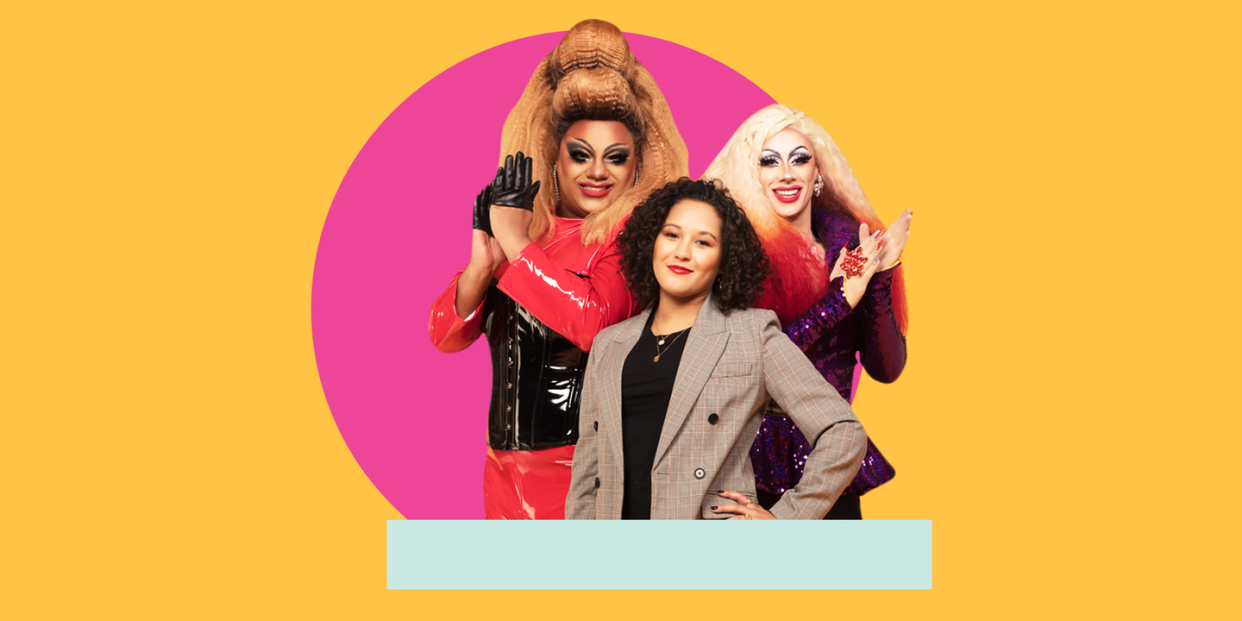
They stare at me, smiling. I swallow. My throat is so dry it feels like I am choking. I want this job. And I know I can do it. My well-prepared notes sit in front of me. They offer no answers. My brain feels full of fog. As soon as they ask the first question I know that I am screwed.
Everyone gets nervous at job interviews. But what happened that day was more than just a few butterflies fluttering in my stomach. My shyness took over.
And when it does, it changes my entire personality. Everything that makes me me is wiped away. The more I try to think of what to say, the more nervous and awkward I appear. I can’t maintain eye contact, so find myself stuttering, staring at a spot on the wall. I feel as if my skin has been ripped off and they can see every bone, every vein.
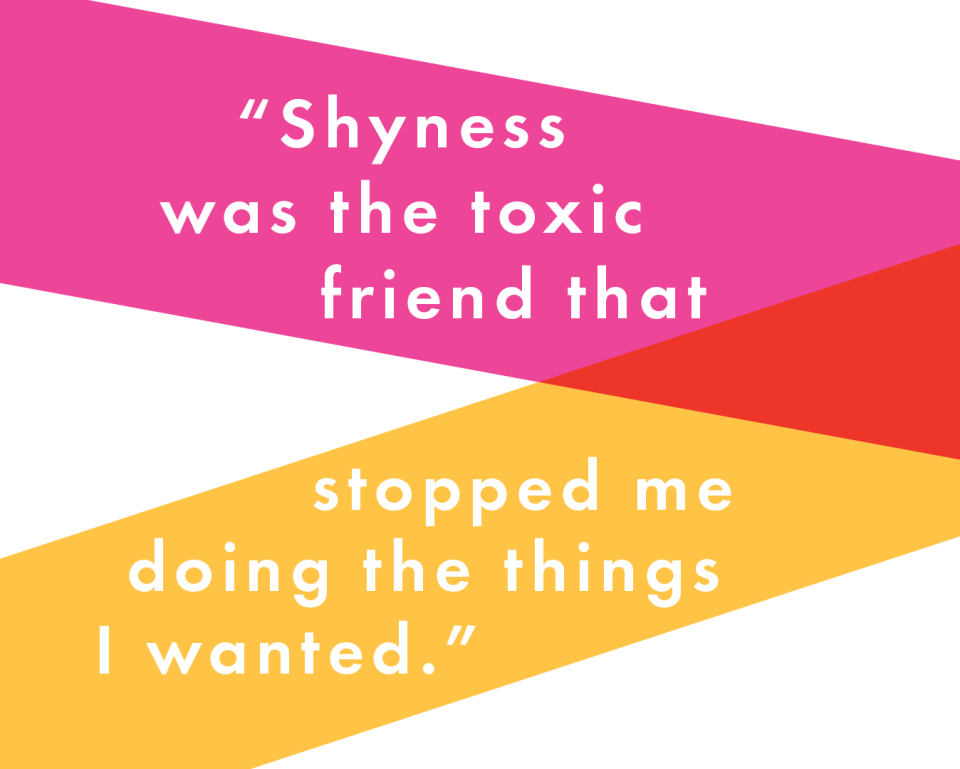
Needless to say, I didn’t get the job. I vowed that would be the last time I let that happen. Shyness was the toxic friend that stepped in and stopped me from doing the things I wanted. It was now my mortal enemy and I would defeat it at all costs. I would become someone who’s self-confident and makes a great first impression wherever they go. I would not let shyness rob me of any more opportunities. But how?
The answer came, unexpectedly, through my TV screen. A few months after that car-crash interview, the UK was gripped by drag queen fever – as the first episode of RuPaul’s Drag Race UK hit the BBC. I watched these marvellous creatures sashaying down the catwalk in bright, beautiful outfits. Even when they messed up, they owned it, taking criticism by raising their chins high and still declaring that they were winners. I needed to be like them. I needed even a pinch of their confidence. If they couldn’t teach me how to own a room, who could?
Surrounded by all her supplies – a cardboard wig box, balanced on top of a silver suitcase, fixed firmly in place with a rainbow luggage strap – Divina De Campo sits tending to her nails and barking with laughter. It’s the laugh that made her famous. She came second on RuPaul’s Drag Race UK and has been singing, acting and TV presenting for decades. But the talent I most want to learn from her is how at ease she is with new people. When she arrived 10 minutes ago, her face still made up from an earlier shoot, she brought with her a warm energy that swept away the jangle of nerves I’d been feeling all morning. She tells me this is how she has always been – growing up, near Huddersfield, Divina was “innately” confident and knew she could perform. I, on the other hand, shut down when a barista in a coffee shop tries to make small talk. So are we both set the way we are? If Divina was born for the stage, was I born for a lifetime of awkward silences?
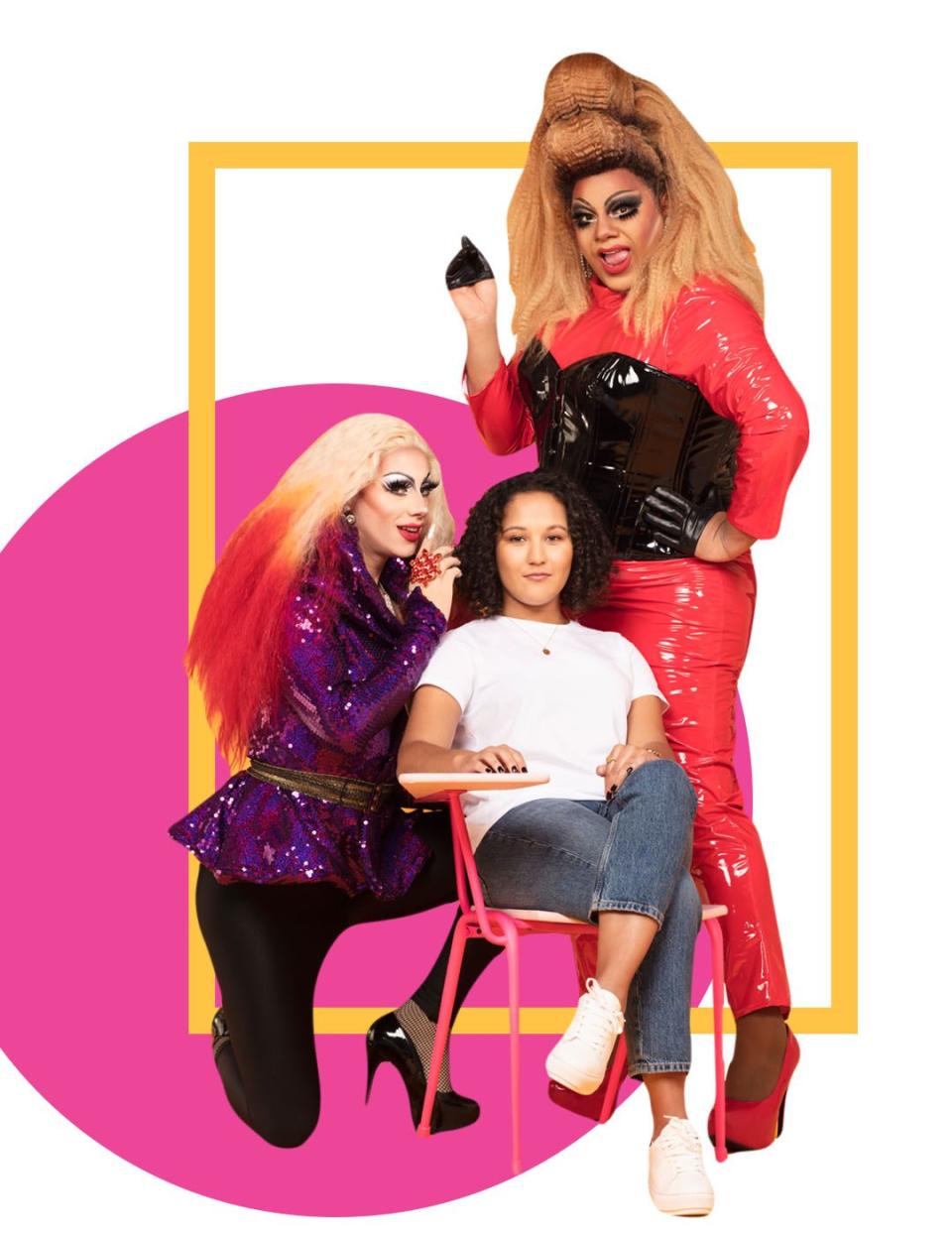
I worry that I’ve come across a roadblock early on, but then Divina surprises me by saying that there have been times she’s felt afraid and under-confident; moments you wouldn’t suspect as they occurred when she discovered drag.
“It’s weird – as Owen [Divina’s non-drag name] I was really confident, and then starting out in drag made me the complete opposite. It’s taken a long time for me to be as confident as Divina.” Contemplating why that was the case, she mentions how much of a perfectionist she can be. “I know when something is good and when it’s not, and I knew that I was not good when I started,” she says, a grin breaking out on her face.
This makes sense to me. I’m at my most shy when I am in situations where I could potentially embarrass myself or in which I need to impress. Because I wasn’t actually born this way – and not many shy people are. My parents aren’t shy, and genetics, according to scientists, don’t play too much into what makes a person shy. A study compared the behaviour of identical twins, who share the exact same genes, and non-identical twins, who share around half, to try to understand the degree to which shyness is influenced by the genetics we’re born with. Based on the findings, it’s believed around 30% of shyness traits are related to genetics, while the rest is down to environment.
“It can be nature – a temperament that tends to go that way – and it can be childhood or life experiences that make you feel skittish… because maybe you’ve had bad experiences with intense social judgement having caused a lot of pain,” author Susan Cain, whose book Quiet studies introverts, tells me.
It was heading to university that triggered my shyness. Before that, I’d been a normal kid – fine at school, and though I wasn’t exactly keen on presentations or drama class, they didn’t fill me with terror. I had a stable group of friends, who I’d known since primary school, and there had never been any real need to venture out of my comfort zone. That was until I hit 18 years old, and moved to Manchester, five hours away from my childhood home in West Sussex. I was supposed to be officially an adult, but an awkward adolescent was fumbling around inside me – and, surrounded by strangers, that took over. I tried to shake it off with a few rum and cokes – a short-term solution that meant I never truly felt at ease. And eight years later I still don’t. Because life – it seems to me – can feel like just one form of job interview after another. Especially as I’ve entered the world of journalism, where it’s so much about first impressions. When it comes to making “contacts”, or even just friends, the imprint you make in those first few moments is key – and I, often, don’t make a very good one. If we’ve just met, the chances are you’ll get nervous Ellie, who’s painfully quiet and seems, quite frankly, boring. Only those who really know me see the happy, quick-witted Ellie who loves to make people laugh with stupid jokes and wry remarks.
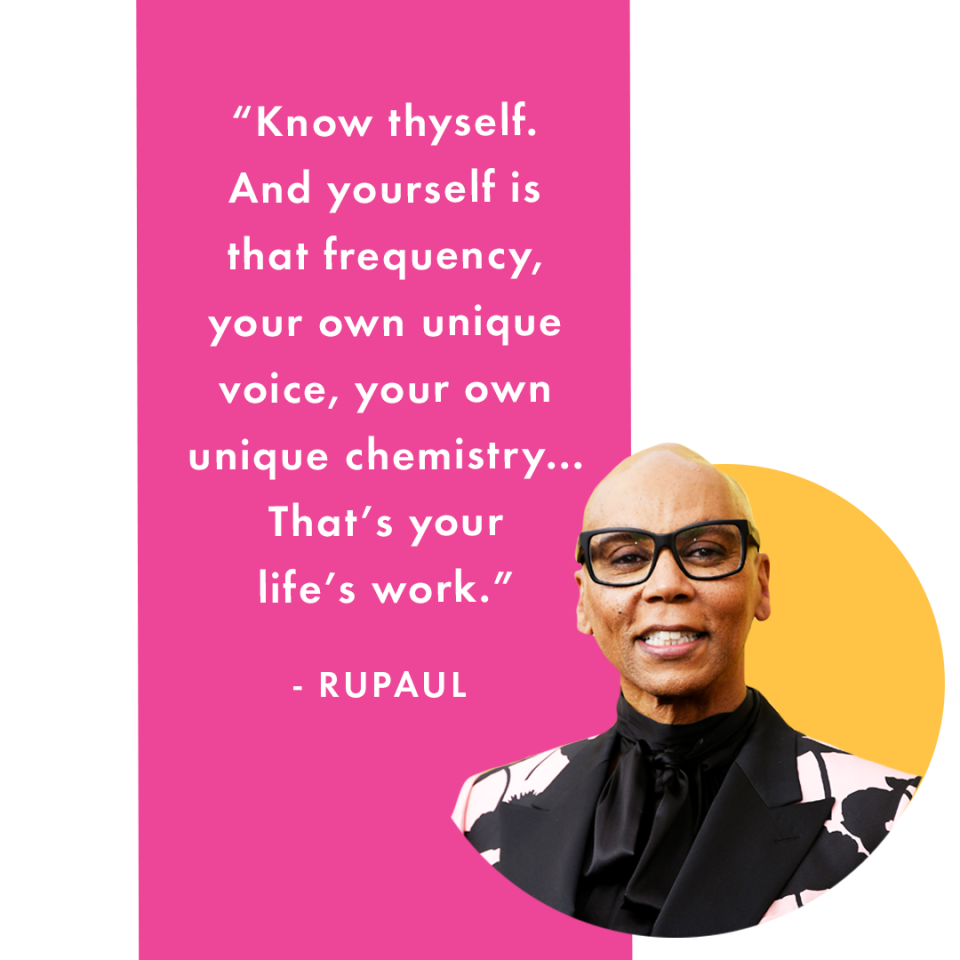
Then there’s social media – which Divina believes has contributed to her issues with comparing herself toother people. “When I was 15, I didn’t really care what people thought,” she says. “But as I’ve got older that’s began to seep in more. And that’s not helpful to anybody. But it is hard to stop. Before, I was aware that people were better at certain things than me, but I’d just say to myself, ‘What can I do?’ and highlight to myself what I was good at.”
“Shyness is the excessive fear of social judgement,” Cain explains. So it makes sense that Instagram, and opening up our lives to everyone, would further shyness in anyone. “You have plenty of extroverts who are shy,” she adds.
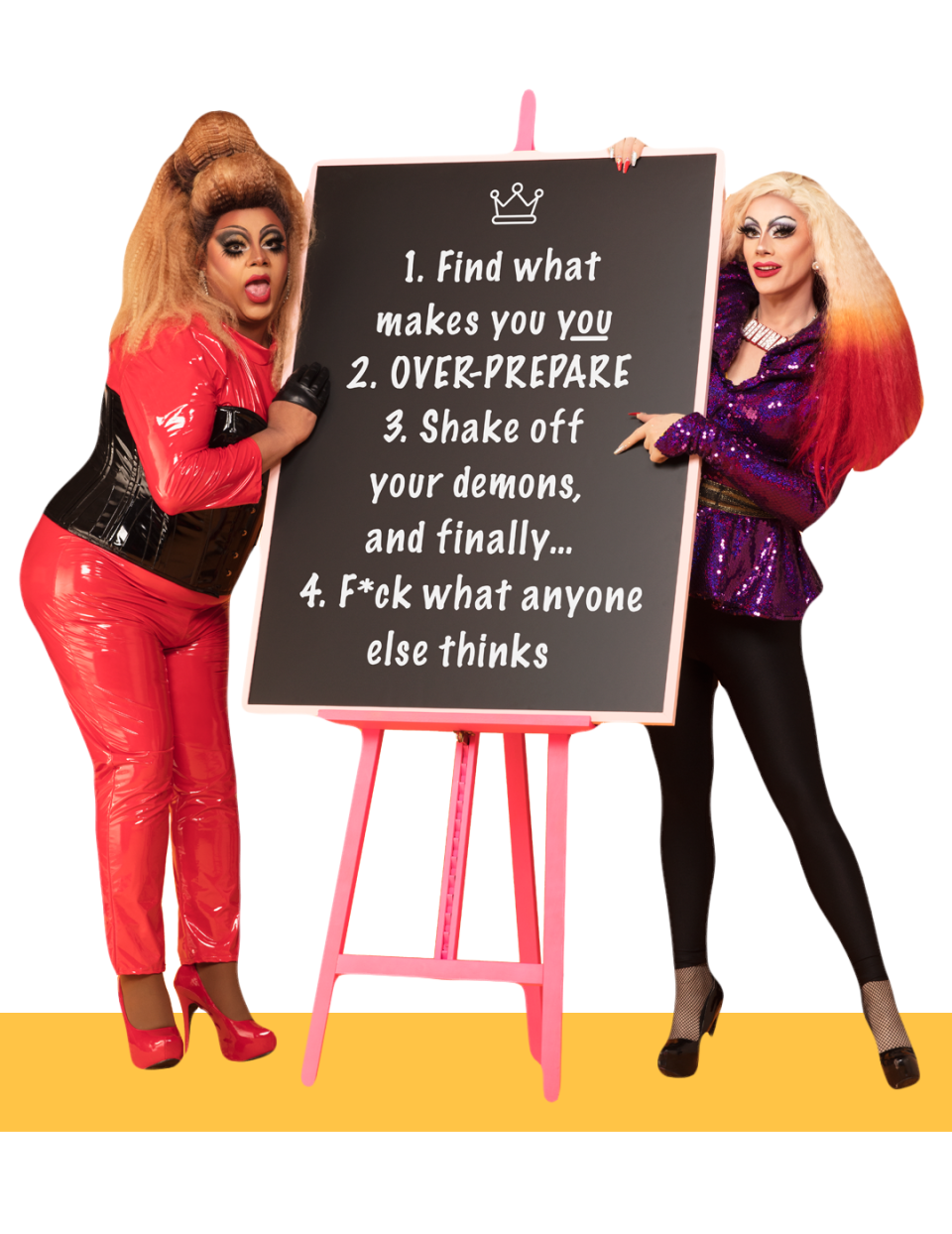
Asking the queens if they’re introverts or extroverts almost seems like a pointless question. Of course I know the answer. “I’m definitely extrovert, capital EX-TRA,” laughs Vinegar Strokes, who sashayed down the Drag Race catwalk in a dress made of book pages, which was falling off her as she walked – yet she still strutted like she was in custom-made Chanel.
And while it doesn’t seem like you’re born shy, according to research, the hardwiring of our brains means we’re most likely born either an introvert or an extrovert. While the brains of both introverts and extroverts produce the stimulating chemical dopamine – which is responsible for our feelings of pleasure and reward – receptors in the brains of extroverts are less sensitive to it. Extroverts, therefore, need more outside stimulation, such as social interaction, to produce additional dopamine. But, the thing is, an extrovert is someone who thrives on being around other people… Not someone who is naturally confident at public speaking.
Skills like that, I’m learning, are honed. Vinegar speaks a lot about turning on her “confidence button” and that there are still often times – networking with people in her field, for example – when she feels challenged. But if I saw Vinegar at a party, I’d look at her chatting to everyone and feel a flare of jealousy that she could do it so easily. I’m often envious of how confident everyone else appears. But, in reality, I have no idea how they’re feeling inside. They could be just as nervous as me, but better able to mask it. Divina confirms this. “There are absolutely [times when] I struggle and worry – like auditions. And those little demons that just kind of creep up and latch on to your back – they can paralyse you. You just have to think, ‘Does it matter? No, it doesn’t. Nobody’s going to die.’”

But why are some people so much better at hiding their nerves? “Oh, I mean some people are just better actors. But I also think that that’s a muscle that can be flexed just like any other. And, little by little, you can develop that,” says Cain.
Learning skills like that comes from pushing yourself, explains Divina. “I’m very goal-driven. I’ll put myself through absolute hell if I know that, in the end, something will come from it… it’s how I approached a charity sky-dive and it’s how I approached Drag Race,” she tells me, laughing. “I’m not going to enjoy this but I know that in the end it will help.” To get to that place, she also constantly prepares. “I’m really anxiety-prone, so I over-prepare for everything. I go in with too much stuff and I know – whatever happens – I’ve got a plan.”
There are certain things we all do to try to tell the world who we are. We wear clothes that represent us, we proudly proclaim our star signs, that we are “just so Leo”, and we mould ourselves around our personalities, popping ourselves – and others – into boxes that feel impossible to break free from. Having lived with it for such a long time, shyness is so ingrained in me that it’s my identity. I’m “the quiet one” and I feel like any unexpected change in my behaviour would bring unwanted attention. So on comes the self-preserving shield of shyness. What’s meant to protect me from the judgement of others actually makes me judge myself even more harshly.
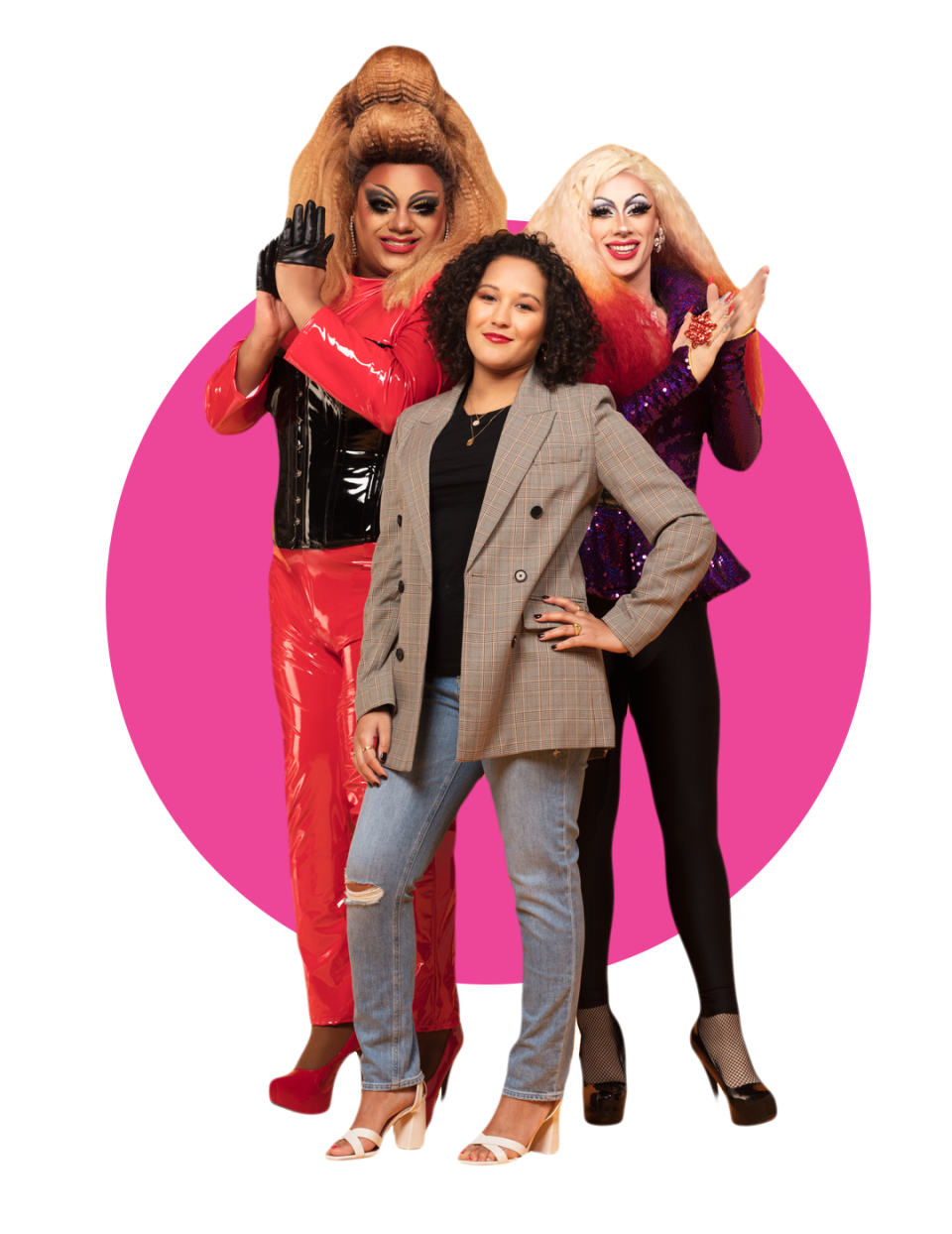
Then there are the other expectations that are placed upon me before I have even opened my mouth. As a mixed-race woman with curly, out-there hair, I feel like racial stereotypes dictate that I should have a loud and outgoing personality. Because I don’t, it’s as though, somehow, I’ve “failed”. I raise this with Vinegar Strokes.
“Yeah, I think there’s pressure,” she says. “Like, if you are black, you’ve got to be really fierce. But it’s like, no – I’m someone who just likes to sit down and be quiet sometimes. When I am fierce, my version of fierce is very different to what you might expect.” Her advice for dealing with that kind of pressure? “F*ck it. Just be yourself. Yourself is what people will go towards.”
That is essentially what drag has taught both of them – their ability to carve out their own niche and show the world exactly who they are. “Drag covers everything,” says Vinegar. “It covers music, TV, politics… that’s so powerful. You can express whatever kind of voice you want in drag.”
“It questions everything that you’ve been told you have to be,” adds Divina.
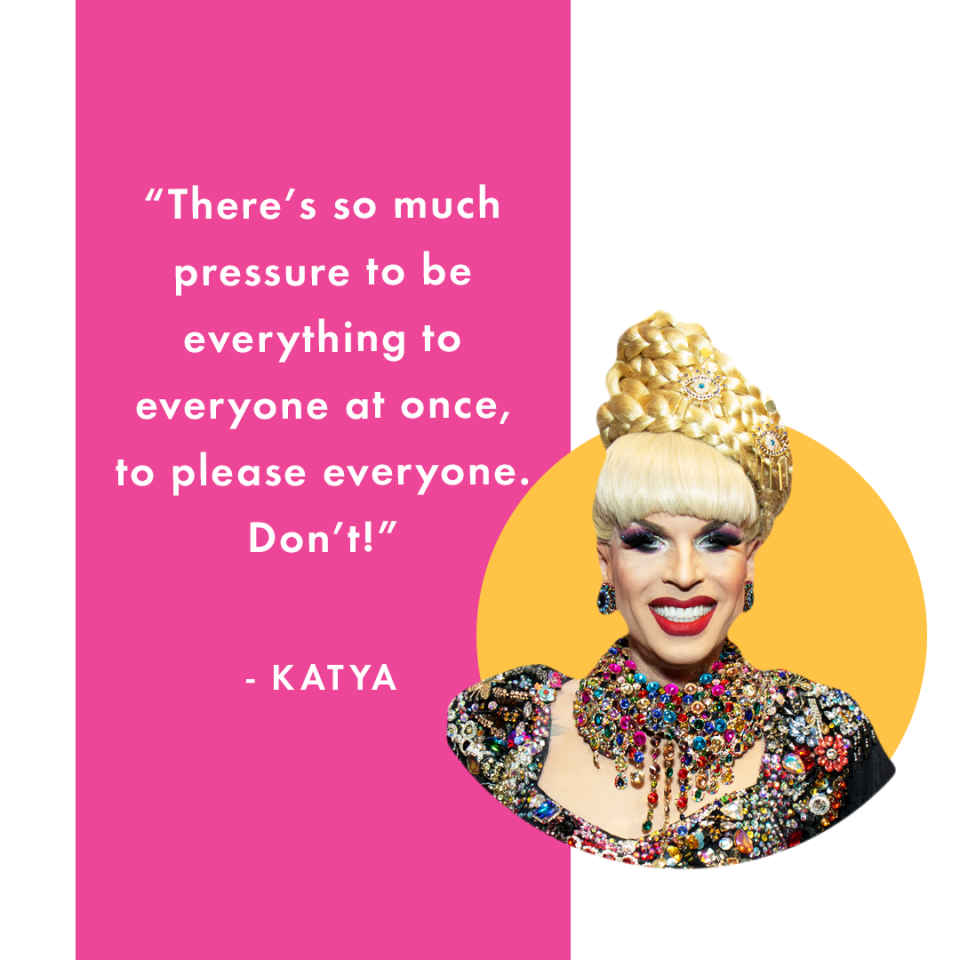
Being shy is the thing I hate most about myself, but through the queens, I’ve come to recognise that it might not be the albatross around my neck I once thought it was. Professionally, as a writer, being on the quieter side gives me the ability to listen and observe from the periphery. In my personal life, it’s brought me deep, treasured friendships that I know will last a lifetime. I’m realising that these skills make me who I am, and even if I wanted to change, I can’t become a “room owner” overnight.
Vinegar and Divina are two wonderful, multifaceted people who have had their struggles with confidence but have learned to conquer that. Meeting them has made me realise that perhaps my shyness has been holding me back because I’ve given it power. Secretly I’ve cultivated it, as a shield with which to fend off the world and any uncomfortable moments that I’m not sure how to deal with. Society tells us we should all aim to be super-confident and that shyness is something to be fixed. But drag is all about acceptance – demanding it – from those who want to define you as something else. I need to embrace and accept who I am. I don’t want to be an extrovert, I just want to be myself.
This feature originally appeared in the May 2020 issue of Cosmopolitan UK. Subscribe today and get 6 issues delivered to your door for just £6.
Like this article? Sign up to our newsletter to get more articles like this delivered straight to your inbox.
You Might Also Like


